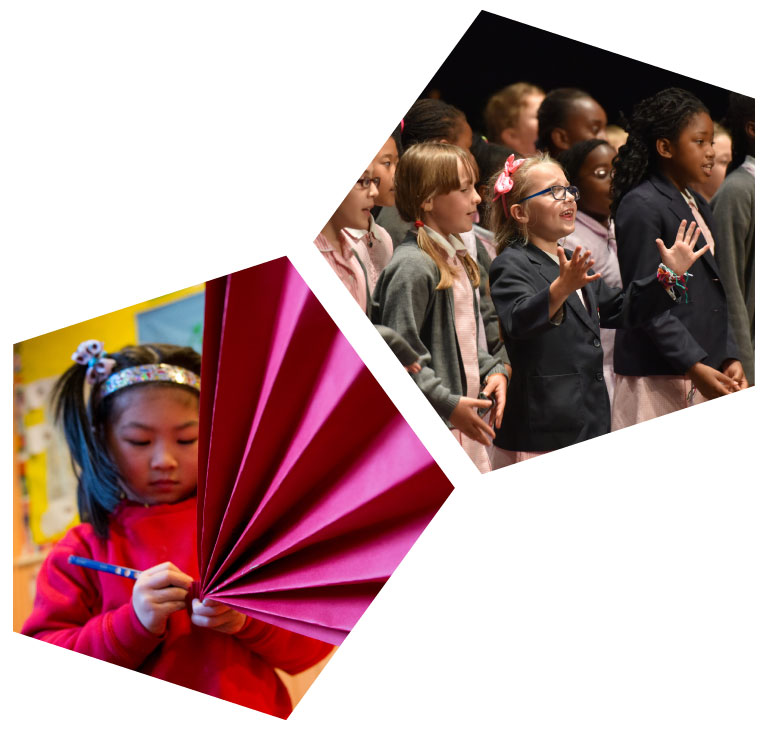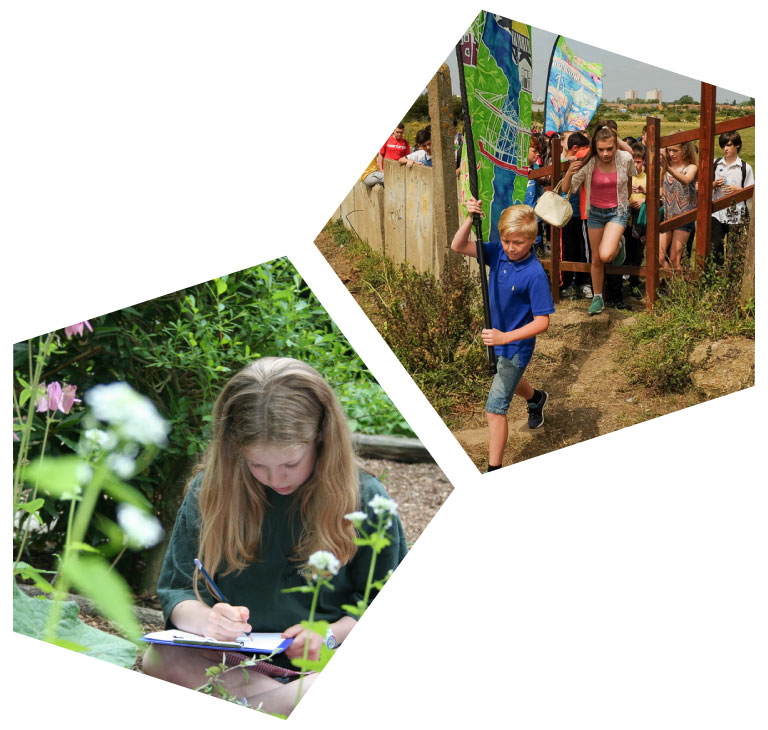Internal Factors
Responses showed us that young people’s most pressing barriers to culture and creativity were ‘Internal’ – relating to their own values and feelings, and the attitudes of those around them.
Many said they felt unsupported and misunderstood by parents and other adults. This was echoed in their views on the education system, as well as more distant ‘world-scale’ changes. In reference to people in power, a participant said: “One person’s opinion could make you feel as though your voice isn’t as strong.”
“People aren’t confident creatively”
“Laziness in young people”
“Parents’ negative perception”
“Teachers [not open to creative futures]”
“People’s lack of belief in you”
“Societal prejudice”
“Non-supportive family, friends, teachers”
External Factors
The biggest external barriers identified by the young people were larger-scale global issues, even though they were encouraged to focus on cultural access in their own locality. This could be seen as encouraging, as it shows that young people are aware of the importance of politics, even if they lack a sense of detail or empowerment to act on their own responses.
“Lack of availability and accessibility in areas”
“Lack of time or free days due to school pressures”
“Age restrictions” (e.g. young people feel excluded)
“Loss of exposure and reduced opportunities [in the arts]”
“Economically divided society” (i.e. rich vs. poor)
“Less money and less free time”
“Job worries”
“Lack of transport”
“Rising fuel costs”
“Money” (personal wealth)
“Rising costs in the creative industry”
“I don’t think there is as much money created by creative jobs.”
“Cuts to public funding”
“Third world issues such as poverty”
“Migrant crisis”
“Rural issues and location and not knowing the right people”
“In some rural areas, a lack of ethnic diversity”
“Immigration”
“Higher levels of childbirth”
“Rise in crime”
“Higher levels of terrorism”
“Immigrants in Calais”
“War and ISIS”
“Independence will shut away other cultures so we may not experience as many different cultures.”
“Climate change”
“Global warming”
“Polar ice caps melting”
“Floods” (but low awareness of floods as a local risk)
“Forest fires/deforestation”
“A rise in population”
“Brexit” (mentioned by all groups, sometimes positively e.g. “Freedom from EU”)
“Donald Trump” and “US elections”
“Cuts to the NHS”
“Global politics and conflict (USA, Russia)”
Relational Factors
“Global competition for academic levels”
“Academic subjects are being pushed in school”
“New GCSEs”
“Exam ratio weighted toward written over practical so it’s harder to pass”
“Michael Gove removing art-related subjects from schools.”
“New technology”
“Digital technology (need more access)”
“Virtual Reality”
“Robots taking over our jobs”
“Better mobile phones available”
Near Future

Responses to these questions showed us young people’s pressing concerns for the future. Big issues like war, climate change, employment, youth crime and population increase were at the forefront of their discussions.
They spoke about Economic and Political threats as being closely linked, in terms of future impacts on personal income and funding for cultural projects. Personal Health was also seen as a key concern, particularly mental health and exam stresses for young people.
External factors in focus
Threats
Concern about lack of arts provision in schools:
“Fewer arts professionals in the future”
“Unequal – creative hobbies will cost more money”
Fewer people will study arts at university because of rising tuition fees
A less culturally-rich education will have an impact on quality:
“No actors to play in films”
“People less able to solve problems”
Impacts of conflict and a bigger population on culture:
“Tourism will go submarine”
“People will be left to educate themselves and access culture through technology”
Opportunities
Art and creativity are connected with all aspects of life, not just a separate subject.
In the future, art will be “more common”, with “pop-up creativity”
Young people may be consulted more in the future, or should be.
Threats
Funding cuts
Concerns about reduced funding for schools and culture
Affects on public life, including crime rates, and more demand for social care
Less money
Earning less money
Rising fuel costs
“As university fees rise, fewer people will be studying”
The UK losing talent as it will be “cheaper for artists to work abroad”
Education reforms affecting the skills pipeline
If schools only focus on ‘core’ subjects, “education results will go down”
Potential growth in unemployment if people don’t have the right skills
Young people are not very aware of the value of the creative industries to the economy
Employment
Decline in cultural industries will mean fewer work opportunities
“Less creative investment and funding for projects [so] fewer jobs in the arts”
Less work because “jobs being taken by robots”
Access to culture
Fewer cultural venues
Reduced transport to rural areas
Rising costs and falling value of the pound caused by Brexit making cultural and leisure activities less accessible.
Opportunities
Potential for links between schools and creative digital experts and businesses
Support for young people in setting up their own businesses (entrepreneurship)
Creativity seen as valuable in all areas of work, e.g. “creativity in maths”
“A society free of money”
New types of jobs could be an empowering trend towards freelance or alternative career paths
If new houses and schools are built in their areas, also potential for new/increase in jobs
Threats
“EU referendum will increase divides in communities”
“Reduce numbers of families from the EU, leading to less diversity”
Many young people echo popular views that refugees will continue to be a ‘threat’, with tensions ongoing as they settle in the UK.
Overcrowding, from both immigration and higher levels of childbirth.
Intergenerational division:
Parents and other adults “already have their careers/futures sorted so they just say ‘that’s life’”
Increased costs of social care mixed with an increase in population – demands on young people
Opportunities
Creativity and culture offer the greatest opportunities:
“Arts are a possible tool for making bad situations better”
Can be used for “connecting people [in a] global community [and] developing empathy and compassion”
“The arts react [to] and mimic how society is at the time” so are helpful for social cohesion, e.g. where “refugees develop artworks to tell their stories”
Creative approaches could find “solutions for housing, architecture for diverse families and social structures [could result in] mixed communities with different backgrounds and ages”
Education:
Opportunity for ‘online schools’
“Teachers thinking creatively to engage students in all subjects, and be more flexible”
Threats
All groups were environmentally aware, showing concerns about:
“Polar ice caps melting”
Industrialisation impacting on human health, e.g. “More people working in industry will increase pollution”
“Forest fires [and] flooding ruining homes and lives”
Opportunities
Technology:
“Creativity used to solve problems” – with green technology, recyclable/upcyclable art and new energy sources.
“Less [need for] physical travel” – thanks to new technology
A need to invest in the arts:
Because without them, “less creative people to make imaginative gardens so less plants”
Art could be “more eco-friendly”, either through materials or by raising awareness of environmental issues through art
Far Future

In this part of the workshop, we used three questions to draw out imagined future scenarios, based on the changes the young people suggested in their views of ‘Now’.
In general, the young people envisaged future worlds shaped and enabled by technology, with creators as its ‘heroes’.
Ideas on the hobbies and interests of children and young people in the far future
“We’ll be more creative in the home space”
“3D books and screens you can control with your hand gestures”
“Interactive/robotic moving sculptures using AI”
“Augmented Reality films where the action happens in the physical city”
“The ability to make movies and games with realistic effects in your spare time”
“Virtual worlds so we can experience them in life-size”
“Evolutionised” transport, sport, movies and music through technology
“Different genres of music, e.g. robots clashing together, hard, loud music”
Young people will continue to rebel through music no matter how much it changes
“Artificial painting [and] being able to be inside a game”
“New cooking forms [as our tools change]”
Sport might embrace new ways to participate, with an “E-Sports Olympics”
Preserving old venues
Reimagining dance styles and listening to old music
Respecting old books more, “viewing them as retro vintage”
Using technology to travel back in time or “escape back in time using VR”
“People may spend longer time outside or at cultural events in order to avoid technology.”
Ideas on how these changes might impact on access to arts and cultural learning for children and young people
“Different cultures of dance being taught”
Young people in the future might “see old tradition in a new light”
“People won’t think the same as now”, as they might be controlled more by those in power or the media
“Fine motor skills” for operating technology such as lightning or music equipment
Curatorial skills to choose from wealth of content – “choosing the music”
To ensure these future skills, we need to start by “building attitudes at primary school level”
“A move away from knowledge-based schools to open-ended problem solving”
School in the future might be seen as a creative activity
“Young people leading their own learning, being enterprising and ‘rebellious’ in gaining appropriate skills”
“The people who fight against the squeezing out of creativity will be the people to rebuild it”
Creative charities would exist, to support arts where schools can’t.
Forming a ‘Creative Army’ to help non-creative workplaces
Ideas on skills young people will need to access meaningful employment
“Instant connectivity and cloud-based thinking”
“People will always be looking to make new things and will come together to make them”
Tools might include a “thought visualiser”
Practical skills for a tougher future, using Science, IT and Food Technology to solve food crisis etc.
Artificial intelligence – “speech recognition”, and even “interpreting language patterns of other animals”
People will need to be proactive to fill their own time in positive ways.
“Shifts in attitudes to money – it’s not what makes people happy”
“A three-day [working] week will be normal.”
“Adaptability”
“Flexibility”
“Versatility”
“Efficiency”
“Perserverance”
“Problem solving and the ability to think outside the box”
Skills and attitudes needed for the future will be “trust, openness, positivity, optimism, determination, fun, more compassion, motivation, imagination, fearlessness and risk-taking, confidence in self-expression and rebelliousness”
“Being approachable, positive, creative people, happy people with good ambitions, good at independence as well as teamwork and understanding”
“Positivity and communication”
“More socially literate”
“Applying community thinking”
Imagination will be useful in areas like engineering and “being a drone pilot”.
Back to now
Overall, the responses suggested that many young people (unless already strongly involved) have very little awareness of the creative and cultural industries in terms of its practices, impact, breadth and possibilities. Some have basic awareness of dynamics of power in terms of how local Government and agencies work to lobby change.
We also asked them to make a personal pledge about the action they would take for their own future. Their personal pledges (not included here) showed strong commitment to making their future a success and an awareness of the importance of creativity in an unpredictable future.